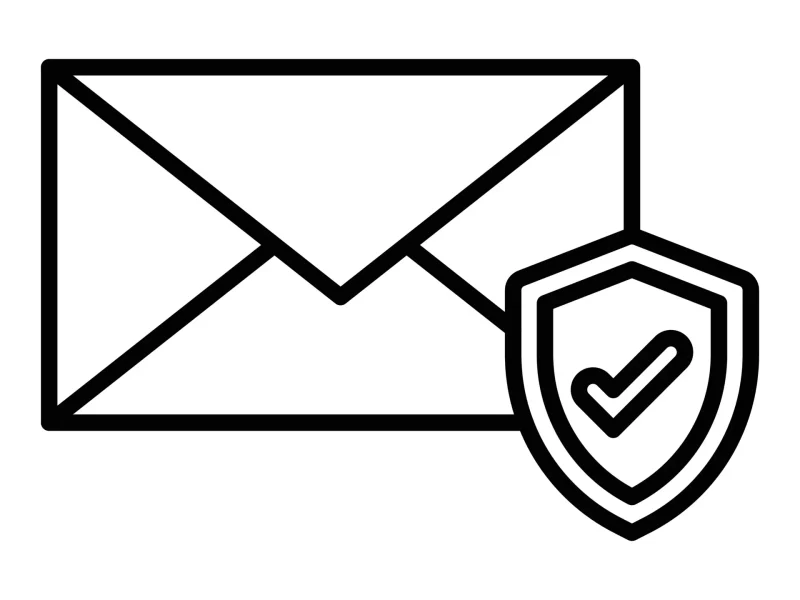Keep your emails secure
Email Security
Safeguarding emails from unauthorised access, phishing attacks, malware, and data breaches to protect sensitive information and privacy.
Secure Your Emails Today
What is email security?
Email security involves implementing security measures to protect email systems, messages, and attachments from various security threats, such as phishing attacks, malware, spam, and unauthorised access.


Why email security matters?
Emails are the gateway to your business’s most sensitive information. From financial details to confidential client communications, your inbox holds valuable data that needs to be protected. Without robust email security measures, your business is vulnerable to a range of threats, including:
- Phishing Attacks: Deceptive emails designed to trick recipients into revealing sensitive information.
- Malware & Ransomware: Malicious software that can infect your systems and disrupt operations.
- Data Breaches: Unauthorised access to confidential data that can lead to financial and reputational damage.
Why should you invest in email security?
Protection
Email security solutions safeguard organisations from phishing attacks, malware distribution, and unauthorised access attempts, reducing the risk of data breaches, financial losses, and reputational damage.
Compliance
Investing in email security helps organisations comply with industry regulations and data protection laws by implementing robust security measures, encryption standards, and data loss prevention policies, avoiding regulatory fines and legal consequences associated with non-compliance.
Continuity
By preventing email-based threats, such as malware infections and phishing scams, email security solutions ensure uninterrupted business operations, mitigating the impact of security incidents on productivity, reputation, and customer trust.
Productivity
By reducing spam and malicious emails, email security minimizes distractions and threats, allowing employees to focus on their work without security-related interruptions.
Explore our email services
Spam Filtering
Automatically detect and block spam emails to reduce inbox clutter and minimise the risk of falling victim to phishing scams and fraudulent activities.
Phishing Protection
Identify and block phishing emails that attempt to deceive users into disclosing sensitive information or clicking on malicious links, protecting against data breaches and financial losses.
Malware Detection
Scans email attachments and links for malware, viruses, and other malicious content to prevent infections and data breaches within the organisation's network.
Multi Factor Authentication
Implement strong authentication mechanisms, such as two-factor authentication (2FA) and multi-factor authentication (MFA), to verify the identity of email senders and prevent unauthorised access to email accounts.
Encryption
Encrypt email messages to ensure the confidentiality and security of sensitive information during transit, protecting against unauthorised interception or disclosure.
DMARC/DKIM
DKIM (DomainKeys Identified Mail) verifies email authenticity through digital signatures. DMARC (Domain-based Message Authentication, Reporting, and Conformance) enhances email security and authentication.
HOW WE WORK
Our 3-step process
Discovery Call
We start by learning about your business challenges and goals. This helps us identify how our IT services can best support you.
Onboarding
During the onboarding phase you will be introduced to the team of experts who will guide you through the process.
Maintain
Ongoing management, IT support, and optimisation of IT infrastructure, systems, and software.
Frequently asked questions
Email security involves protecting your email communications from threats such as phishing, malware, and unauthorised access. It’s essential because emails are a common entry point for cyber attacks, which can lead to data breaches, financial loss, and damage to your business’s reputation.
To protect against phishing, implement robust email filtering to block malicious emails, use advanced threat detection tools to identify suspicious activity, and conduct regular security awareness training for employees. Training helps staff recognise and avoid phishing attempts, reducing the risk of falling victim to scams.
DMARC (Domain-based Message Authentication, Reporting, and Conformance), DKIM (DomainKeys Identified Mail), and SPF (Sender Policy Framework) are email authentication protocols that help prevent email spoofing and phishing. They work by verifying that emails claiming to be from your domain are legitimate, reducing the chances of attackers impersonating your business in phishing attempts.
- Email encryption secures your communications by encoding the content of your emails, making them unreadable to unauthorised parties. This ensures that sensitive information, such as financial data or personal details, is protected during transmission and can only be accessed by the intended recipient.
Multi-Factor Authentication (MFA) adds an extra layer of security by requiring users to provide two or more verification factors, such as a password and a code sent to their mobile device, before accessing email accounts. MFA reduces the risk of unauthorised access, even if a password is compromised.
- Spam filtering helps protect your business by automatically blocking unwanted and potentially harmful emails from reaching your inbox. By filtering out spam, you reduce the risk of phishing attacks, malware, and other email-based threats that can disrupt your operations.
Threat detection tools monitor your email traffic for signs of suspicious activity, such as unusual login attempts, phishing links, or malware attachments. These tools help identify and block threats before they can cause harm, keeping your business’s communications secure.
Security awareness training educates your employees about common email threats, such as phishing and malware. By teaching staff how to recognise and respond to these threats, you reduce the likelihood of successful attacks, making your organisation more resilient against cyber threats.
Ensuring compliance with data protection regulations, such as GDPR, involves using encryption to protect sensitive information, implementing DMARC/DKIM/SPF protocols to prevent spoofing, and providing security awareness training to your employees. Regularly reviewing and updating your email security practices helps maintain compliance and protects your business from regulatory penalties.
If you suspect a security breach, you should immediately notify your IT team and take steps to contain the threat. Cyber United’s email security services include incident response and support to help you address and mitigate any security issues promptly. For guidance on handling email security breaches, see NCSC’s Incident Management.
Cyber United’s email security services are designed to seamlessly integrate with your existing email systems, providing an additional layer of protection without disrupting your current workflow. We offer solutions that are compatible with major email platforms and can be customised to meet your specific needs.
Yes, email security services can help prevent data breaches by securing email communications and protecting sensitive information from being intercepted or leaked. Cyber United’s solutions include data loss prevention and encryption to ensure that your business data remains secure. For more on preventing data breaches, visit Information Commissioner’s Office.
Phishing is a type of cyberattack where attackers attempt to trick individuals into revealing sensitive information or installing malware. Cyber United’s email security services include anti-phishing measures that detect and block phishing emails, protecting your business from these malicious attempts. For more on phishing, visit Action Fraud.
Cyber United’s email security services include spam and malware filtering, email encryption, phishing protection, and threat intelligence. Our solutions are designed to provide comprehensive protection for your email communications and prevent malicious attacks.
